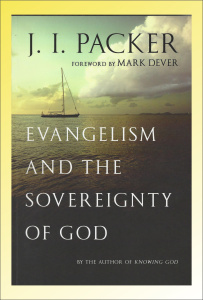Packer Explains God’s Sovereignty and Human Responsibility
 J. I. Packer. 2008. Evangelism and the Sovereignty of God (Orig Pub 1961). Downers Grove: IVP Press.
J. I. Packer. 2008. Evangelism and the Sovereignty of God (Orig Pub 1961). Downers Grove: IVP Press.
Review by Stephen W. Hiemstra
We live at a time of spiritual lethargy, which is often rightly equated with laziness. In part, this lethargy is the result of philosophical postmodernism that winsomely accepts ideas in obvious tension. Tension arises when my reality and your reality differ, but rather than work out the differences we just ignore the tension, as if it would just go away. But when the subject turns to God, this tension will not simply go away because God’s salvation is not defined by our convenient, custom realities; God defines the one reality that matters because he created it. If we are going to understand God’s reality, then we need to study theology.
In his book, Evangelism and the Sovereignty of God, J. I. Packer addresses the question: “if God is in control, why should we do anything at all?” (8) Packer answers the question by first observing that the apparent contradiction between divine sovereignty and human response is just that “an appearance of contradiction” (24), not a real contradiction, which arises because God is both king and judge (27). As king, God makes the rules; as judge, he holds us accountable. Packer writes:
“What the objector has to learn is that he, a creature and a sinner, has no right whatsoever to find fault with the revealed ways of God. Creatures are not entitled to register complaints about their Creator.” (28)
Because we are created by God as moral agents, we must not be tempted neither to believe that we alone are responsible for the Gospel’s effectiveness nor that God will sovereignly bring the Gospel to everyone on his own (30-40).
Packer sees evangelism as “to present Christ Jesus to sinful men in order that, through the power of the Holy Spirit, they may come” (44) to him in faith and as having only two motives—the love of God and the love of mankind (74).
The presentation of the Gospel message, according to Packer, has 4 parts: it is a message about God, sin, Christ, and a summons to faith and repentance (60-71). Of course, the details here matter. For example, Packer see the true conviction of sin as having 3 aspects:
Awareness of a wrong relationship with God;
Conviction of sins always includes conviction of particular sins.
Awareness of our sinfulness—complete corruption and perversity in God’s sight. (64-65)
Another obvious detail is that the person of Christ and his divine work should not be separated (66-67).
At the time of publication, J.I. Packer was a professor of Theology at Regent College in Vancouver, British Columbia (Canada) and is best known for his book, Knowing God. Evangelism and the Sovereignty of God is written in 4 chapters:
Divine Sovereignty.
Divine Sovereignty and Human Responsibility.
Evangelism.
Divine Sovereignty and Evangelism.
These chapters are preceded by a foreword, preface, and introduction.
One of the more memorable points that Packer makes, is also one of his first:
“…what we do every time we pray is to confess our own impotence and God’s sovereignty. The very fact that a Christian prays is thus proof positive that he believes in the lordship of his God” (16).
Yes, yes, yes! Unfortunately, not everyone prays and prayer can be difficult in the absence of a clear theology to lead us. In a period of spiritual lethargy, when theology is held in contempt, this can clearly be a challenge.
As here in Evangelism and the Sovereignty of God, J.I. Packer is distinguished by his clear exposition of biblical truth. Oftentimes, his clarity makes the Gospel seem simpler than the many theological controversies would lead us to believe—thank goodness.
Reference
Packer, J.I. 1993. Knowing God. Downers Grove: InterVarsity Press.





